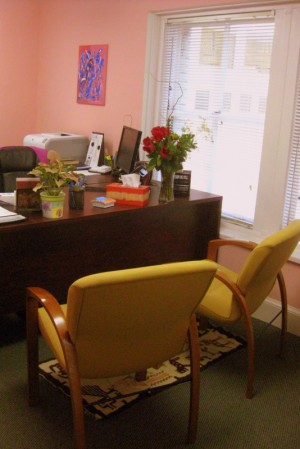Our Place: Helping Forgotten Women Find Their Place in D.C.
When a man is sentenced to serve time in prison, he often has a support system; if visits are allowed, his partner dutifully shows up, dressed to impress, exclaiming to children about how they’re “going to see Daddy!” When a woman is sentenced, whatever support she has is usually marshaled in service to her kids, to keep them out of the foster care system; there are few visitors making the drive to women’s facilities, eagerly anticipating a glimpse of Mommy.
That disparity is also reflected in the dearth of organizations dedicated to helping women who were formerly incarcerated transition to life on the outside. In fact, there is only one group in the country that focuses solely on helping such women– Our Place D.C. Our Place is on K street NW, just down the street from Pedro and Vinny’s renowned burrito stand. There, on “burrito block”, in an understated building, in a cozy suite of offices one floor up from the traffic on Route 29, lives are being changed.
It’s easy to forget about such women; they are imperfect, guilty of poor judgment or more, and all of them are ex-cons. Most of us reserve our support for the “innocent”, or more accurately, for sympathetic victims. It doesn’t occur to us to consider those who have served their time, only to be dropped off in this city with nothing but a prison-issued sweatsuit on their backs. “It used to be worse”, Ashley McSwain tells me. She’s the Executive Director of Our Place. Before, newly-released women would arrive in that orange jumpsuit associated with inmates. “We convinced them to change that. The effort was called ‘Justice, not Jumpsuits’.”
McSwain is the kind of warm, unpretentious lady you’d want to sit next to at a beauty salon; the non-profit she runs reflects that vibe, all brightly painted rooms, uplifting art and comfy chairs. When I walked in to Our Place last week, I didn’t think “prisoners”. It actually reminded me of a college counseling department. I kept expecting to see internship offers or posters for graduate school on the walls.
Our Place D.C. provides services to woman who are either in or just out of prison. It’s an all-encompassing program. I found myself using the term “360 degrees” when describing it to others.
“We have a Legal Clinic with two full-time attorneys, plus a clothing boutique full of donated items. We help with case management, job placement and we hold employment workshops. We also work on HIV-prevention– including counseling, testing, referrals and more.”
Indeed, there are “goody bags” filled with condoms and information about safe sex nestled in a basket a few feet from the entrance to Our Place– just like college.
“Usually, people are pleased that we’re actually helping this population, but when we are looking for funding? People are appalled. They don’t want to give money to people who’ve been in jail. It’s an odd mix of reactions. There’s real appreciation for the work that we do, but when it comes to giving money, people have several other charities they would rather give to.”
McSwain has been in D.C. for two years; she moved here from Philadelphia in 2008 and has the Eagles gear in her office to prove it. Before moving south, she spent six years of her career as a probation officer. For ten years, she worked with the homeless. She knows the challenges her clients are struggling with inside and out, which makes a difference when she’s trying to help them meet the conditions of their release, some of which “don’t allow for success for these women.”
McSwain says it’s fairly common for Our Place’s clients to get their allowance from prison and come directly to 1518 K Street because of the relationships that were forged before release; the group accepts 500 collect calls a month from women who are incarcerated.
“If you go into prisons, you can create a plan so that when a woman is released, she can begin our program. This approach could reduce the recidivism rate.
“Every month, we go and do an orientation with these women. Those who are interested volunteer for case management before release, and that continues after they get out. When they show up, they have no identification, no clothing, and no way to get anywhere– so they come to us.
“We can help them decide what their next move will be. We help them with transitional housing, metro cards, money to get birth certificates and police clearances.”
So who are the women who seek help from Our Place? According to McSwain, the average client is 38-46, so she’s middle-aged. She has generally been arrested once or twice. She has one or two kids. She has often been the victim of sexual or domestic violence. She might have a very thin work history– 41% do not have a high school diploma or G.E.D. A whopping 96% are African-American. Our Place’s clients are self-selected.
“These women volunteer to come, so they are eager to make changes in their lives. They are open to our services and support. Our clients are very respectful. There is no arguing or fighting. We have created a healthy, warm space here and our clients are very appreciative of that.”
TOMORROW: The “stigma” attached to serving this population. Plus, how you can help.
-
Maddy67
-
http://DCentric.org Anna John







